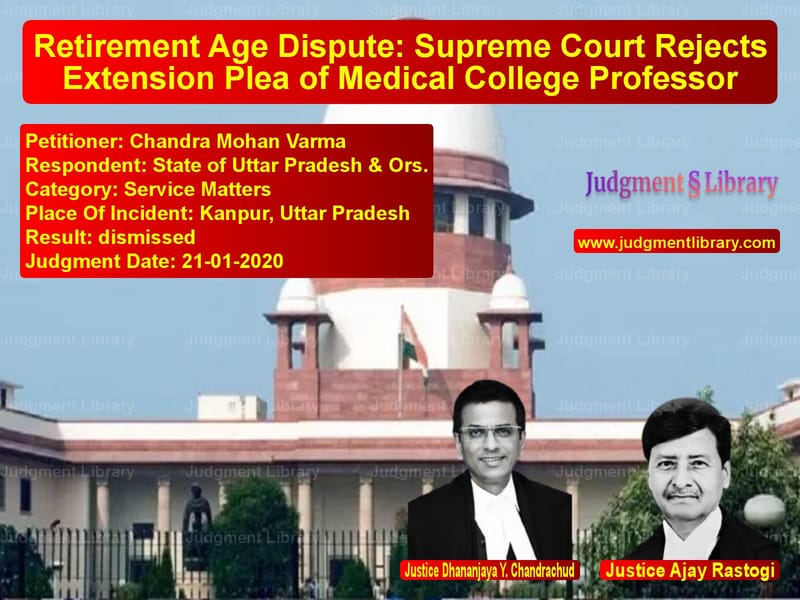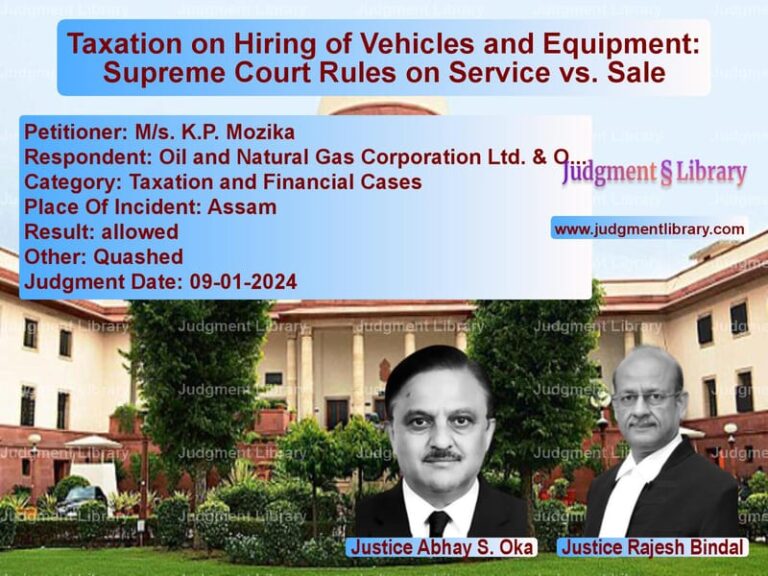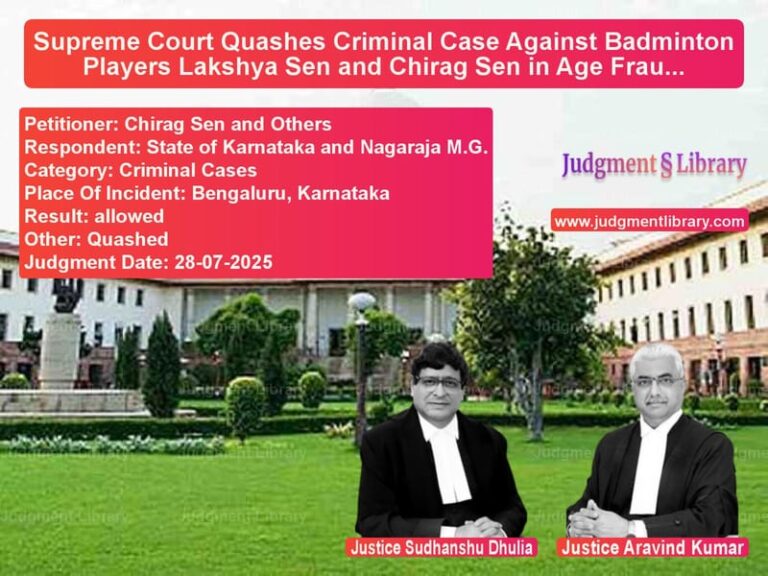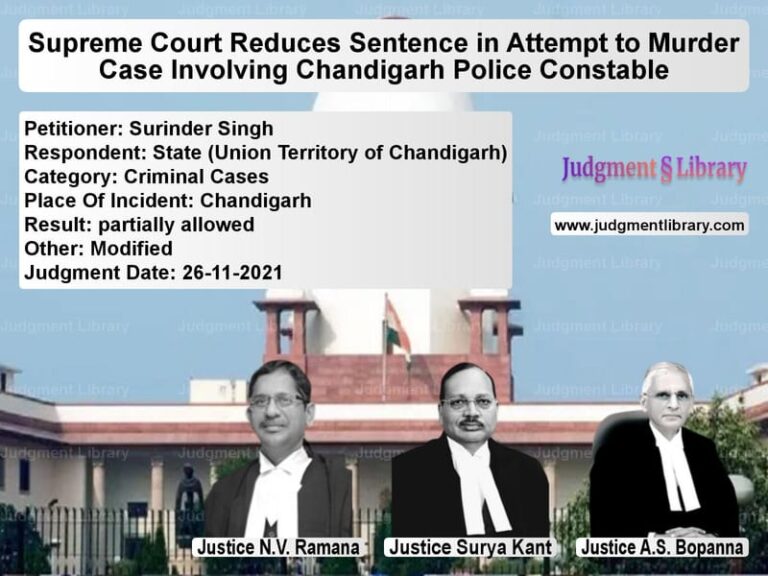Retirement Age Dispute: Supreme Court Rejects Extension Plea of Medical College Professor
The case of Chandra Mohan Varma vs. State of Uttar Pradesh & Ors. is a significant ruling in the domain of service matters, specifically concerning the retirement age of government medical college professors. The Supreme Court dismissed the appeal filed by the petitioner, who sought an extension of service until the age of 65 based on a government notification issued after he had already reached the retirement age of 60.
The ruling provides clarity on the application of service extension benefits and the binding nature of government notifications vis-à-vis pre-existing fundamental service rules.
Background of the Case
- The petitioner, Dr. Chandra Mohan Varma, was serving as a Professor and Head of the Department of Cardiology at the LPS Institute of Cardiology, GSVM Medical College, Kanpur.
- Under Rule 56 of the Uttar Pradesh Fundamental Rules, the retirement age for medical college professors was 60 years.
- The petitioner attained the retirement age on August 13, 2014, and was due to retire by August 31, 2014.
- However, he was granted an academic session extension under a government decision dated November 19, 2012, allowing him to continue working until June 30, 2015.
- On February 6, 2015, the Uttar Pradesh government issued a notification extending the retirement age of medical college professors from 60 to 65 years.
- The petitioner sought the benefit of this new notification, claiming that since he was still in service under the session extension, he should be allowed to continue working until the age of 65.
Key Legal Issues Considered
- Was the petitioner entitled to the benefit of the February 6, 2015 notification despite already having attained the previous retirement age of 60?
- Did the session extension provided under the 2012 government order effectively extend the petitioner’s retirement age?
- Was the Uttar Pradesh government’s notification extending the retirement age to 65 applicable retrospectively?
- Did the petitioner’s continued service after 60 qualify him as an employee eligible for the new retirement age limit?
Arguments of the Petitioner (Dr. Chandra Mohan Varma)
- The petitioner argued that since he was still in service on February 6, 2015, the notification extending the retirement age to 65 should apply to him.
- He contended that the session extension granted to him should be considered as an effective continuation of service, thereby making him eligible for the new retirement age.
- He further claimed that denying him this benefit was discriminatory, as other professors who turned 60 after the notification date had received extensions.
- The petitioner relied on previous High Court rulings where similar service extensions had been granted in the education sector.
Arguments of the Respondent (State of Uttar Pradesh)
- The state government argued that the petitioner had already attained the retirement age of 60 before the notification was issued.
- They contended that the session extension was a temporary measure to avoid academic disruption and did not alter the official retirement age.
- The government maintained that the notification extending the retirement age to 65 was prospective in nature and applied only to faculty who were still actively employed under the old rules.
- The state also asserted that no other professor who had already retired before the notification date had been granted the benefit.
Supreme Court’s Observations
- The Court noted that Rule 56 of the Fundamental Rules clearly prescribed a retirement age of 60.
- It observed that the petitioner was only granted an academic session extension to prevent disruption in teaching, not as a continuation of regular service.
- The judges ruled that the session extension did not alter the official date of retirement and did not entitle the petitioner to claim benefits under the new notification.
- The Court stated: “A person who had crossed the age of 60 before the issuance of the notification and attained the age of superannuation but was on an extension until the end of the session would not be entitled to benefit from the increase in the age of retirement.”
- The Court also dismissed claims of discrimination, as the state government confirmed that no other retired faculty member had been granted this benefit.
Final Judgment
The Supreme Court dismissed the petitioner’s appeal, ruling that:
- The notification dated February 6, 2015 extending the retirement age to 65 did not apply retrospectively.
- The petitioner had already attained the retirement age of 60 before the notification was issued and was only serving under an academic session extension.
- The session extension was not equivalent to active service and did not entitle the petitioner to claim benefits under the new rule.
- The petitioner’s service ended on June 30, 2015, and he was not entitled to any further extension.
- The state government was directed to process and release the petitioner’s terminal benefits within two months.
This ruling reinforces that changes in retirement age do not apply to employees who have already reached their retirement age before such changes come into effect. The judgment also clarifies that temporary session extensions do not alter official superannuation rules.
Petitioner Name: Chandra Mohan Varma.Respondent Name: State of Uttar Pradesh & Ors..Judgment By: Justice Dhananjaya Y. Chandrachud, Justice Ajay Rastogi.Place Of Incident: Kanpur, Uttar Pradesh.Judgment Date: 21-01-2020.
Don’t miss out on the full details! Download the complete judgment in PDF format below and gain valuable insights instantly!
Download Judgment: Chandra Mohan Varma vs State of Uttar Prade Supreme Court of India Judgment Dated 21-01-2020.pdf
Direct Downlaod Judgment: Direct downlaod this Judgment
See all petitions in Termination Cases
See all petitions in Public Sector Employees
See all petitions in Pension and Gratuity
See all petitions in Judgment by Dhananjaya Y Chandrachud
See all petitions in Judgment by Ajay Rastogi
See all petitions in dismissed
See all petitions in supreme court of India judgments January 2020
See all petitions in 2020 judgments
See all posts in Service Matters Category
See all allowed petitions in Service Matters Category
See all Dismissed petitions in Service Matters Category
See all partially allowed petitions in Service Matters Category






